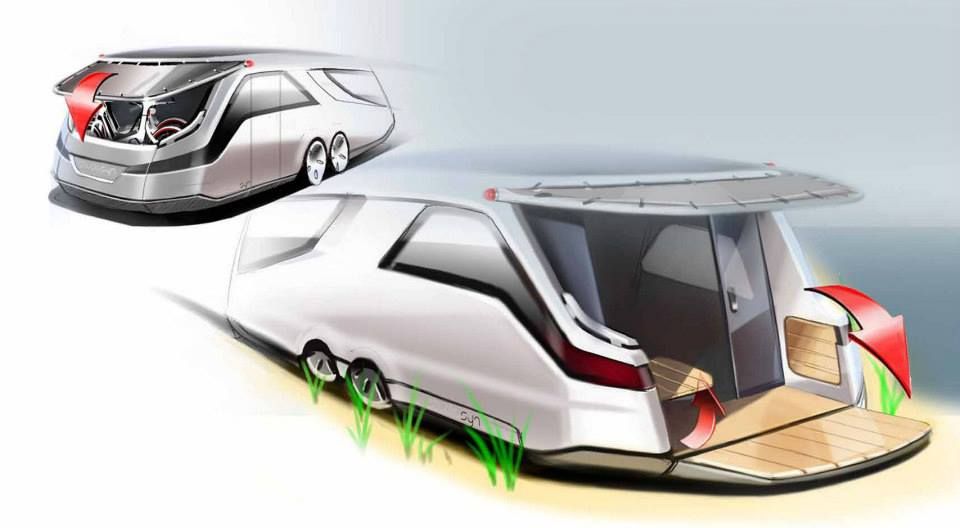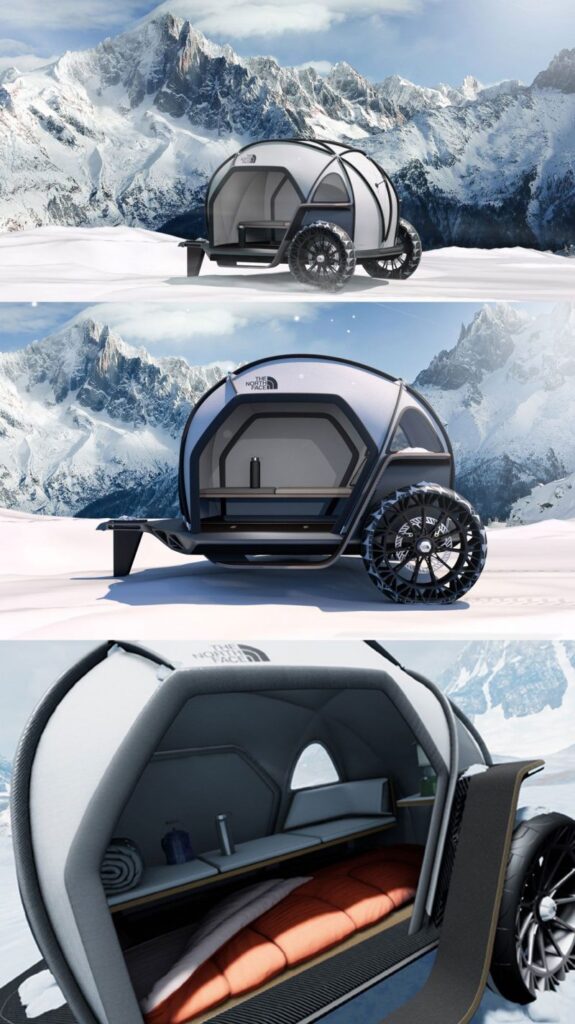In my previous post ‘The Last Generation of Touring Caravans’, I started a debate about the touring future of caravans. This was with reference to the UK Government’s intention to cease the sale of conventional petrol and diesel engines vehicles in 2030. In the subsequent post, I looked at the technology and the challenges ahead that might an impact on the touring caravan. Again this was set against the wider environmental issues that are driving the debate. It is now time to paint the picture as I see it for the future.
A Summary of the challenges ahead
I suppose the first real big question to be addressed is there going to be a need for touring caravans in the future? This not an easy question to try and answer and at this moment in time there is no definitive answer as we can not necessarily predict the trends and needs of future generations. With that in mind, I will give my reasons why I believe that our grandchildren and great-grandchildren will want to tour and create the need for suitable mobile accommodation which the touring caravan will evolve into.
The future world that I see, is one that will become more reliant on technology and innovation. Without going into the minutiae details, I believe that will mean that the people of the future are going to have more leisure time and to keep our future generations healthy and contented this leisure time will have to be actively filled.
Education will be an essential part of our development as will the ability to appreciate other people’s cultures for safe integration and reaction with each other. If we look back to the 1700 and 1800s we see that to go on the ‘Grand Tour’ of Europe was considered to be an essential part of an ‘up and coming’ young person education I fully appreciate that back then this was also the preserve of the wealthy, as was the majority education but they were the next generation of leaders and social influencers. So I see the need to travel and learn about other people, their cultures and traditions or the geography of their living environment is just as equally desirable as it has ever been. The ability to do it as we do now with some sort of ‘Mobilehome’ will be equally desirable.
Whist talking of peoples’ cultures. Anyone who has been to Spain caravanning for any length of time will be fully aware that on Friday nights the Spanish pack up and head out to the camping grounds on mass. This is due to the fact that a lot live in flats and other small areas in the cities and look forward to the weekends in the country with green space. All of the research modelings of future populations suggest that well over half will live in urban environments, with all the space and other restrictions that city-life brings. It is easy to see why escaping to the ‘great-outdoors’ will continue to appeal to future generations and enhance their wellbeing.
Let us look at some of the quick facts about the current camping and caravan industry:
- The whole UK camping and Caravan industry is worth £9.3 billion a year to the UK economy.
- Of the above, £2.4 billion is spent by campers in the UK.
- Within the UK since 2013 the number of new registered motorhomes has risen year upon year to 14,665 in 2018.
- Germany has the most caravan in use with 674, 700
- The UK comes in second with 555,000 caravans in use.
- There is nearly 3.4 Million caravan in use across Europe.
- Nearly 64 Million nights were spent by people camping in the UK alone during 2018.
- The British Government in 2019 announced £246 Million into battery research and the creation of battery the UK Battery Industrialisation Centre in Coventry.
I give these figure to show the amount of money directly and indirectly involved with the camping and caravanning industry. This is no small amount and industries and those investing will want the best possible returns. Therefore there will be a desire to solve any problems that are presented by the requirement of all industries and societies to become more eco-friendly. There is a lot of money currently invested in research on battery and other technologies. The developments made will be integrated into every aspect of life as we strive to fundamentally change the way we manage and use power. Currently our ability to store electricity or other renewable sources of energy is some what negligible, and the production of the ability to store and provide 24/7 power from renewable sources is the ultimate goal. Use of the development into power storage will be deployed into all available fields, including caravanning. As will developments in other technologies so as to maximize returns on developments.
What is on the Horizon
I think we all accept that the ability to store renewable energy and the ability to use is wherever and whenever on demanded is the way forward for all aspects of life and that includes caravanning. Currently, that means that battery technology is key to the issue. With our current battery technology weight of vehicles and trailers weight is critical and the key to immediate progression. We seem to want to address this issue currently by a reduction in size and weight, however small is not always beautiful to all. As Eribarists we all will know only to well those who have upsized because of one reason or another. I upsized from a Triton 420 to a Troll 535 because I wanted the convivence of a front dinette and slightly more space that it provide to help accommodate Boris our Golden Retriever who travels every where with us.
If you are interested in small units the visit the website blog.rvshare.com.
Caravan development in the future is just not going to be limited to development in one technological field but will embrace all developments. We all want to benefit from developments and we all want to have a comfortable experiences when out and about with our caravans. With out doubt battery technology will be the most impactive, but this will not be limited to the ability to tow the unit but how we use the caravan overall. We will want the ability to have efficient 24/7 power on demand.
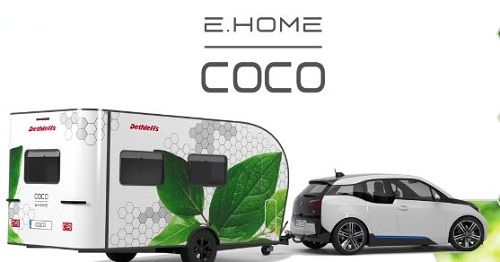
The Erwin-Hymer Group and Dethleffs development of the E.Home Coco is possibly the immediate future. Their use of current battery technology that provides an electric caravan that propels its self and gives an effective towing weight of 100 Kg for a 900 kg unit is certainly an advantage with the current generation of electric towing cars. Not only that, the battery technology is not limited to the propulsion but supplies all the power needs of the unit.
However, the use of a powered caravan and a separate vehicle might be considered a little to extravagant. I know as Eribarists there is somewhat negative felling to motorhomes, and there is the whole debate about caravans v motorhomes but there is a future option that could see a combination of both that will enable the best of both worlds. Check out the German design for a hybrid motorhome caravan at Earthtechling.com
There is a growing market for the use and convivence of motorhomes.
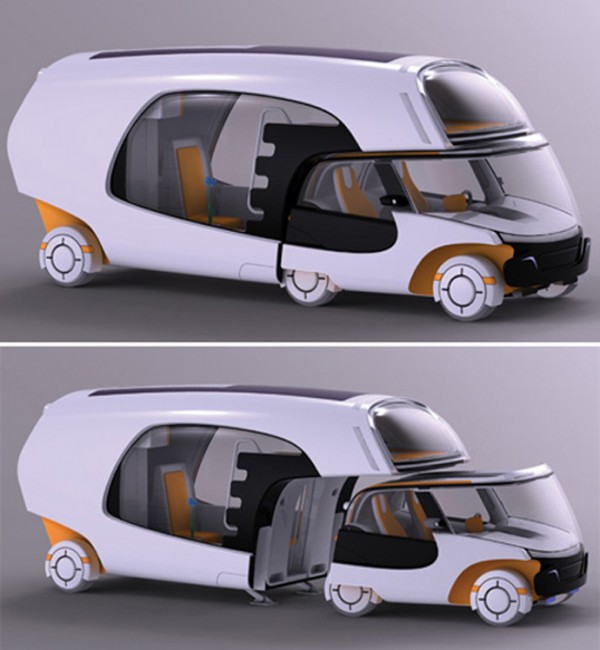
I have already made a link above to the way knew technology is being incorporated in all sorts of ways, BMW and North Face being an example where they are taking developments in Nanospinning technology to provide a material covering for a small camping unit. We can only imagine what is to come, and I suppose that imagination will be the key to the future.
So combine advances in technology and designers imaginations as to what artistically the future will look like and then we will start to get a vision of the future of the caravan.
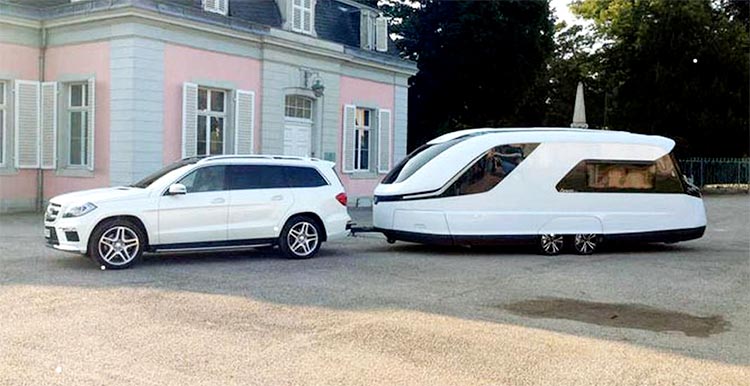
Knaus’ Caravisio is one company’s idea of the next generation of the touring caravan. If you would like to read more about the caravan then visit Azureazure.com
As we go forward new concepts and technologies will come online, but it will be at a price. So for us, the current generation we might find it is all just too expensive. As time goes by and new technology is adopted and becomes main stream pricing will drop and so for future generations it will become affordable. You only have to look at the current generation of caravans and how they have developed over time. This process will continue.
The other aspect to consider is that of campsite development. Without doubt it will be come more important to have the ability to charge your electric car, than your caravan that will have sufficient battery and renewable sources to maintain your living power requirements. However I suppose the question that will be considered is that of overall sustainability. Will campsite exist for touring vehicles? It has already been demonstrated that it is more environmentally friendly to bulk move people by ‘public transport’ from transport hub to transport hub, with alternative options for movement from starting point to transport hub, and transport hub to final destination. Will we really need to take our personal mobile accommodation unit? Or will campsites develop other options for those who want to visit that particular area. Remember if we go back to the modelling for future living, well over half the population will live in cities with little requirement for personal transport, maybe that will eventually be the death knell for the touring caravans and campervans/motorhomes? Only time will tell, and I am unlikely to definitively find out the answer to that question. In the meantime, all we can do is to embrace the efforts of the scientists who seek the answers to environmental concerns and where possible do a little bit to help rectify the problems that we, as a species have caused.

